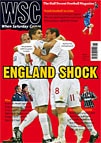 Dear WSC
Dear WSC
In WSC 272 Jonathan O’Brien finds it remarkable that Celtic’s Bertie Auld “straightfacedly asserts that beating Dunfermline in the Scottish Cup final in 1965 was more important than the title win a year later”. But Auld is not alone in his assertion. No less a man than Jock Stein said in the Dunfermline history Black and White Magic: “It wouldn’t have gone as well for Celtic had they not won this game.” The Celtic history The Glory and the Dream also notes: “The largest framed photograph in [Stein’s] office at Celtic Park showed Billy McNeill borne aloft at the end of the match.”Celtic had won nothing since “the 7-1 game”, a freakish League Cup final triumph over Rangers in 1957. So this win, Stein’s first trophy seven weeks after officially becoming manager, stopped a rot which was threatening to turn Celtic into also-rans in Scotland. Without it the Lisbon Lions may never have been and there may only ever have been one “nine-in-a-row” in Scottish football. And that would never do.
Mark Murphy, Chessington
Search: ' youth'
Stories
 New legislation is aimed at a lack of homegrown players but, as Andy West reports, the issues are deeper than that
New legislation is aimed at a lack of homegrown players but, as Andy West reports, the issues are deeper than that
September’s announcement that Premier League clubs will be required to adhere to a “homegrown quota” from the start of next season came as no surprise. The question of whether clubs should be forced to limit the number of overseas players has been openly debated for a long time. In the face of increasing pressure from the government as well as the football authorities, it was sensible for club chairmen to follow the example of the Football League and voluntarily introduce new legislation.
 Taylor Parkes reflects on a new book that paints a gloomy picture of how young players are treated in Britain
Taylor Parkes reflects on a new book that paints a gloomy picture of how young players are treated in Britain
In 1997, concerned that English football was falling behind in terms of youth development, the FA brought in Howard Wilkinson (then, as now, the last English manager to win the League). His mission was to produce a document which would outline the problems and propose a fresh approach; the amusingly titled A Charter for Quality still forms the basis of our youth coaching system. Its changes were far-reaching: clubs would take sole charge of recruiting and developing young players, while the age at which kids could be taken on “full time” dropped from 14 to nine. In the first half of last season, just 66 graduates of Premier League academies appeared on Premier League teamsheets, many of them confirmed benchwarmers. What went wrong?
 Having acquired sporting representatives in Austria and the US, Red Bull have turned to Germany. Paul Joyce assesses the fallout
Having acquired sporting representatives in Austria and the US, Red Bull have turned to Germany. Paul Joyce assesses the fallout
No city exemplifies the decline of East German football since reunification more starkly than Leipzig. Lokomotive Leipzig, European Cup-Winners Cup finalists in 1987, went bankrupt in 2004 and had to restart at the bottom of the league pyramid. They now play in the same fifth division as former GDR champions Sachsen Leipzig, who entered insolvency in March with debts of €3 million (£2.7m).
 Scotland's 2010 World Cup qualifying campaign was a painful experience both on and off the pitch. But Neil Forsyth refuses to be downhearted
Scotland's 2010 World Cup qualifying campaign was a painful experience both on and off the pitch. But Neil Forsyth refuses to be downhearted
Onwards Scotland march. Another major tournament without involvement, despite being in arguably the easiest qualifying group, with senior players picking up a sine die ban for an all-night bender, a manager still trying to convince the public of his suitability and an SFA leadership who increasingly resemble the committee of a provincial bowling club.